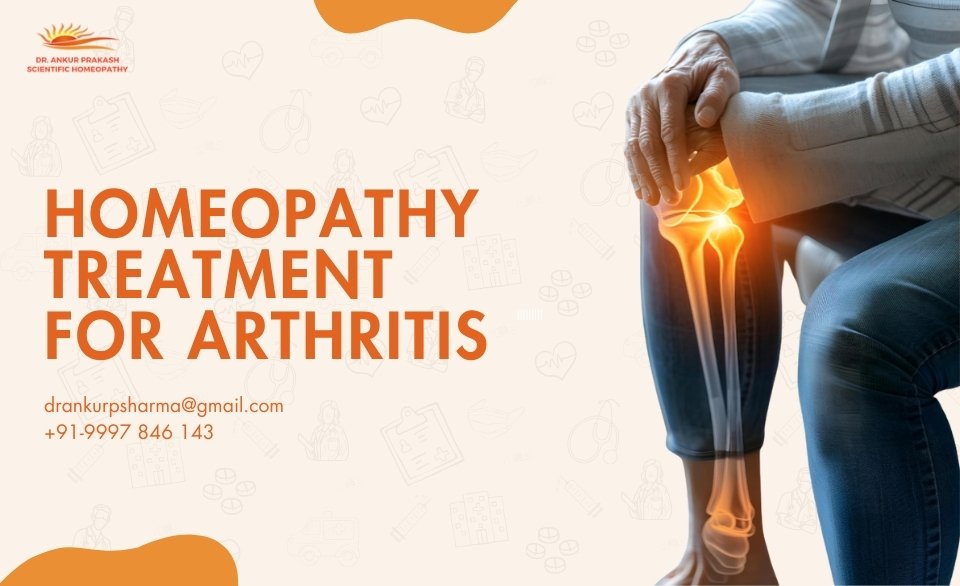Arthritis is a widespread joint disorder that affects millions of people across all age groups, causing pain, stiffness, inflammation, and reduced mobility. With changing lifestyles and increasing stress levels, joint-related problems are becoming more common even at a younger age. Under the guidance of the Best Homeopathy doctor in India, many patients are now choosing natural and holistic options like homeopathy for long-term relief and improved quality of life.
Arthritis is not a single disease but a group of more than 100 conditions that affect joints and surrounding tissues. Among these, osteoarthritis and rheumatoid arthritis are the most commonly diagnosed forms. Early understanding, accurate diagnosis, and the right treatment approach are essential for effective management.
What is Arthritis?
Arthritis is a common condition that affects the joints, causing pain, stiffness, and inflammation. It can impact any joint in the body, leading to reduced mobility and discomfort. There are over 100 different types of arthritis, with osteoarthritis and rheumatoid arthritis being the most prevalent. While osteoarthritis typically results from wear and tear of the joints over time, rheumatoid arthritis is an autoimmune disorder where the body’s immune system attacks the joints. Arthritis can affect people of all ages, and early diagnosis and treatment are crucial for managing symptoms and maintaining a good quality of life.
Types of Arthritis
Arthritis is not a single condition but a group of joint-related disorders that differ in causes, symptoms, and progression. Understanding the different types of arthritis helps in choosing the right treatment approach and managing symptoms more effectively.
- Osteoarthritis
Osteoarthritis is the most common form of arthritis and is often described as a “wear-and-tear” condition. It occurs when the protective cartilage between bones gradually breaks down, leading to pain, stiffness, swelling, and reduced joint movement.
Many patients benefit from homeopathy for osteoarthritis, as it focuses on slowing degeneration and relieving discomfort naturally. Remedies are often chosen based on pain pattern, stiffness, and age-related joint weakness.
- Rheumatoid Arthritis
Rheumatoid arthritis is an autoimmune disorder in which the immune system mistakenly attacks the joints, causing chronic inflammation, pain, and deformity if left untreated. It commonly affects the hands, wrists, and feet.
Options such as rheumatoid arthritis homeopathy, rheumatoid arthritis treatment homeopathic, and best homeopathic medicine for rheumatoid arthritis are widely used as supportive care to help manage inflammation, pain, and fatigue.
- Psoriatic Arthritis
Psoriatic arthritis is linked to psoriasis, a chronic skin condition. It causes joint pain, swelling, stiffness, and may affect the spine or fingertips. Many patients explore homeo medicine for psoriatic arthritis to manage joint symptoms while supporting overall immune balance.
- Gout
Gout is a painful type of arthritis caused by the buildup of uric acid crystals in the joints, usually starting in the big toe. Sudden attacks of intense pain, redness, and swelling are common. Homeopathic treatment focuses on correcting metabolism and reducing recurrence.
Ankylosing Spondylitis
Ankylosing spondylitis primarily affects the spine and can lead to chronic pain, stiffness, and reduced flexibility. Over time, vertebrae may fuse, limiting movement. Many patients seek the best homeopathic medicine for ankylosing spondylitis to help manage stiffness, pain, and inflammation in a gentle way.
- Juvenile Arthritis
Juvenile arthritis affects children under 16 years of age and includes several autoimmune and inflammatory conditions. Early treatment is crucial to prevent long-term joint damage and growth issues.
- Lupus Arthritis
Lupus arthritis occurs as part of systemic lupus erythematosus, an autoimmune disease. Joint pain, inflammation, fatigue, and systemic symptoms are common. Holistic treatment aims to improve immunity and overall balance.
Common Symptoms of Arthritis
Arthritis affects joints in multiple ways. Recognizing common symptoms like pain, stiffness, swelling, and reduced mobility is key to early diagnosis and effective treatment.
Joint Pain
Persistent and recurring joint pain is one of the most common symptoms of arthritis. It often worsens with movement and can affect any joint in the body.
Stiffness
Morning stiffness that lasts for more than an hour is a key indicator of arthritis. This stiffness can make it difficult to move the affected joints.
Swelling
Inflammation and swelling around the joints are typical in many forms of arthritis. The affected area may feel warm to the touch and look red or swollen.
Reduced Range of Motion
As arthritis progresses, it may limit the normal range of motion in your joints, making everyday tasks like walking, bending, or gripping more challenging.
Fatigue
Fatigue is a less obvious symptom but is commonly associated with arthritis. Chronic pain and inflammation can lead to feelings of exhaustion and overall fatigue.
Tenderness
Joints affected by arthritis may become tender to the touch, making it uncomfortable or painful to apply pressure on or around the area.
Deformities
In advanced cases, arthritis can lead to visible joint deformities, where joints may become misaligned or take on an abnormal shape.
Causes of Arthritis
Arthritis can develop due to a variety of factors, including genetics, age, lifestyle, injuries, and autoimmune conditions. Understanding the causes helps in prevention and management.
Genetic Factors
A family history of arthritis can increase the likelihood of developing the condition. Certain genetic markers are known to be associated with specific types of arthritis, making it a hereditary condition for some individuals.
Age
The risk of developing arthritis increases with age. As joints undergo natural wear and tear over time, the cartilage that cushions them can deteriorate, leading to osteoarthritis, the most common form of arthritis.
Autoimmune Disorders
In some types of arthritis, like rheumatoid arthritis, the body’s immune system mistakenly attacks its own tissues, including the joints. This autoimmune response is a primary cause of inflammation and joint damage.
Infections
Certain bacterial and viral infections can trigger arthritis by causing inflammation in the joints. Reactive arthritis, for example, can develop after an infection in another part of the body.
Injury
Previous joint injuries can lead to arthritis later in life. Damage to the cartilage or bones in a joint can increase the risk of developing osteoarthritis as the joint heals and ages.
Obesity
Excess weight puts additional strain on joints, especially in the knees, hips, and spine. This increased pressure can accelerate the breakdown of cartilage and contribute to the development of arthritis.
Gender
Gender can play a role in the development of arthritis. Women are more likely to develop rheumatoid arthritis, while men are more prone to conditions like gout, a type of arthritis caused by a buildup of uric acid crystals in the joints.
How is Arthritis Treated?
Arthritis can be effectively treated with homeopathy medicine, which focuses on providing a natural and individualized approach to healing. Homeopathy treats arthritis by addressing the root causes of the condition, rather than just masking the symptoms. The treatment involves carefully selecting remedies based on the specific symptoms, lifestyle, and overall health of the patient.
Homeopathic Medicine for Arthritis
Homeopathic medicine for arthritis offers a natural and holistic approach to managing joint pain and inflammation. By targeting the root cause of the condition rather than just the symptoms, homeopathic medicine for arthritis aims to restore balance within the body. This treatment is tailored to each individual, taking into account not just the physical symptoms but also the emotional and mental well-being of the patient. Unlike conventional treatments, homeopathic medicine for arthritis is gentle on the body, reducing the risk of side effects while promoting overall health and vitality.
Benefits of Homeopathic Medicine for Arthritis
- Gentle and natural treatment.
- Minimal side effects.
- Suitable for long-term use.
- Addresses both physical and emotional symptoms.
- Helps improve flexibility and joint strength.
Patients often explore options like best homeopathic medicine for arthritis, homeopathic remedies for rheumatoid arthritis, and homeo medicine for osteoarthritis as part of an integrative care plan.
Disclaimer: The information provided in this blog is for general informational purposes only and should not be considered as medical advice. While homeopathy offers a natural approach to managing arthritis, it is important to consult with a qualified healthcare professional before starting any new treatment regimen.
In conclusion
Homeopathy offers a gentle, holistic approach to managing arthritis, addressing both the physical and emotional aspects of the condition. By focusing on personalized treatment plans, homeopathy medicine for arthritis not only alleviates pain and inflammation but also promotes overall well-being. This natural treatment option stands out for its ability to provide long-term relief with minimal side effects, making it a valuable alternative for those seeking to improve their quality of life. Whether you are looking to complement conventional treatments or explore a more natural approach, homeopathy medicine for arthritis can be a powerful tool in your journey toward better joint health and overall wellness.
For the best results, consult with the Best Homeopathy Doctor in India to tailor a treatment plan specifically for your needs.








